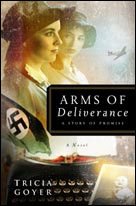I am very happy to have Tricia Goyer as my guest over the next few posts. As an award-winning author of novels and nonfiction books (including a children's book) and hundreds of articles, and as a homeschooling mom and a mentor to other "Generation X" moms, Tricia is a modern-day Renaissance woman. Through her novels centered on the World War II era, including her most recent, Arms of Deliverance (Moody Press, 2006) and the website she has set up for veterans to write about their experiences, Tricia has given those heroes a voice and has provided place and a means for them to record and preserve their stories.
Marilyn: Several of your books take place in the World War II time period. What drew you to that time?
Tricia: Marilyn, I never planned on writing about World War II. When I first started writing fiction, I wanted to write contemporary romances. I had some ideas and my agent even sent proposals out to publishers. But, unfortunately, there were no bites.
Then in 2000, I was in Europe with two writer friends who were both researching for novels. We went to Mauthausen Concentration Camp and I heard the true story about twenty-three American GIs who liberated the camp at the end of WWII. I also heard about a Nazi wife who was the first one into the camp helping the prisoners. The story intrigued me, and I went home to research. During research, I met some of the veterans, and I knew I had to write a fictional story inspired by their experiences. The veterans also gave me ideas for more stories; thus my love for historical fiction was birthed.
Marilyn: I know that you interviewed many veterans of that war. How did you come in contact with them? What was their response? And what did you learn from them?
Tricia: I first contacted them through the website of the 11th Armored Division. The organization gave me the contact information of the individual men. The men responded right away by phone and mail. They invited me to their 59th reunion of their division. I first interviewed them there. I didn't know what to expect, but the men were amazing. They were so excited to share their stories and open up.
I learned from them that they were ordinary men (boys really) who became unexpected heroes. (Actually, they don't even like being called heroes.) They helped me to see that each of us has a place in history--we are here for a purpose and we can rise to the occasion and accomplish more than we think possible with God's help.
Marilyn: Have your research and your books prompted others from that generation to tell you their stories? What has been the most surprising?
Tricia: Yes, after writing about the 11th Armored Division, other veterans contacted me. One man told me his story about being in the Bataan Death March. He asked, "Would you be interested in writing our story, too?" How could I say no? That became the inspiration for Dawn of a Thousand Nights.
I have been most surprised by my love for history. The more I know, the more I want to know. I could write hundreds, thousands of stories!
Marilyn: You've created a website just for WWII veterans to write their stories. Please tell us more about this site, why you created it, and how others can use it.
Tricia: Because I don't have the time to turn each story into a novel I'm sharing some of these stories on a new website, Unforgettable Stories of World War II: www.triciagoyer/ww2stories

Marilyn: Thank you, Tricia!
While you're checking out Unforgettable Stories of World War II, visit the rest of Tricia's website: www.triciagoyer.com/
Next time: Tricia talks about being a Generation X mom and mentoring other moms.
© 2006 by Marilyn C. Hilton
























